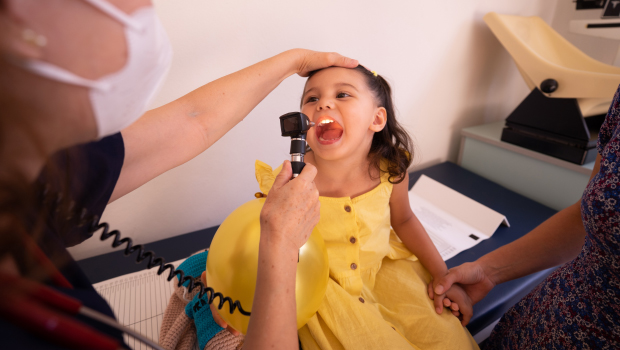Improving child health and care with quality measures

KPWHRI Executive Director Rita Mangione-Smith, MD, MPH, talks about her research to advance pediatric care
Improving health care quality for children — and measuring the impact of quality improvements — is the primary research goal of our executive director. When Rita Mangione-Smith, MD, MPH, took on the leadership of Kaiser Permanente Washington Health Research Institute in 2019, she brought along her established research program in assessing pediatric care quality and evaluating interventions to advance it.
One of Mangione-Smith's projects focuses on hospital-based mental health care for children and youth and lowering readmission rates for suicidal ideation or self-harm. This project recently published findings in the journal Academic Pediatrics. The research is part of a national effort — the Pediatric Quality Measures Program — to support improvements in care for children, particularly those covered by Medicaid. Mangione-Smith answered questions about this ongoing work.
What is the Pediatric Quality Measures Program and how did you get involved?
This program started with the expansion of the Children's Health Insurance Program, or CHIP, by the U.S. Congress and the Obama Administration in 2009. In the first phase, the program developed new, evidence-based quality measures about pediatric care such as whether children receive timely diagnoses, recommended treatment, and follow-up for conditions such as infections, depression, and asthma. The goal of the measures is to help state Medicaid programs, health care organizations, hospitals, and medical professionals track child health care quality and determine if efforts to improve pediatric care are working.
I led a research team that participated in the first phase, developing new measures of pediatric care quality. In 2016, I was funded for the second phase, to lead a Center of Excellence now based at Kaiser Permanente Washington. We are 1 of 6 centers across the country that tested how well the measures work in real-world clinical care.
The program just published results in a special supplement of Academic Pediatrics. With colleagues in the program, I wrote an overview of our work so far. We describe some lessons we've learned from applying the measures and the challenges ahead as we work to implement them in the many places that children receive care, from specialized pediatric hospitals to rural general hospitals.
What have you learned so far?
In the special supplement, researchers from the Pediatric Quality Measures Program report on the process we used for field-testing and refining the measures. We describe our experiences working with hospital partners, representatives of health plans, and pediatric patients and their families to get their input on quality improvement initiatives that use the measures.
My research team focused on one quality measure of hospital-based pediatric mental health care. We developed a measure to determine whether youth who are evaluated in an emergency department for suicidal ideation or self-harm have a follow-up mental health care visit within 7 days. Multiple studies show these timely follow-up visits lower recurrence rates of suicidal ideation or self-harm after an initial emergency room visit and increase the time between emergency visits for these youth.
We applied the measure to data from California, Pennsylvania, South Carolina, and Tennessee Medicaid programs. We found that the measure could be successfully assessed using state Medicaid data to determine if youth aged 5 to 17 years seen for suicidal ideation or self-harm in the emergency department had timely follow-up mental health visits. This is good news because the measure might help health plans including Medicaid, as well as hospitals and health care organizations, measure the quality of their pediatric mental health care and the effectiveness of their quality improvement initiatives.
The results about the current state of mental health care were concerning, though: Our measure showed that only about 54% of youth who should have had a mental health care follow-up visit within 7 days actually had one. In 3 of the states, less than 40% had timely follow-up. We were particularly concerned that white youth were more likely to have a follow-up visit than youth from other race and ethnicity groups, specifically identified in the data source as African American, Asian or Pacific Islander, Hispanic, or of other or unknown race and ethnicity.
What's next for this research?
Our program will continue to publish what we have learned from applying the pediatric care quality measures in real-world settings. We are particularly interested in seeing how the measures might help improve care transitions such as when youth are discharged from a hospital to home. These are points on the care continuum when high-quality communication between hospital and outpatient health care providers as well as providers and family caregivers is critically important to the youth’s recovery.
As we more broadly disseminate the measures developed by the Pediatric Quality Measures Program, and more fully understand where there are quality gaps, we will be able to more effectively contribute to learning about how social factors, particularly the effects of systemic racism, affect pediatric hospital-based care. We want to apply what we learn to reducing inequities in pediatric care.
The special supplement is "Advances in Children's Healthcare Quality: The Pediatric Quality Measures Program 2.0." The Pediatric Quality Measures Program is led by the Agency for Healthcare Research and Quality and the Centers for Medicare and Medicaid Services.
IMPACT Center

Improving mental health care for youth
A new center will support using evidence-based practices in under-resourced settings such as schools.
News

Top pediatrician-scientist chosen to head KPWHRI
Rita Mangione-Smith brings expertise in quality improvement and health systems from leadership posts at Seatte Children's and UW Medicine.
healthy findings

Lessons in screening for adverse childhood experiences (ACES)
KPWHRI’s Center for Community Health and Evaluation proposes 5 necessary elements based on its recent work with partner programs.


